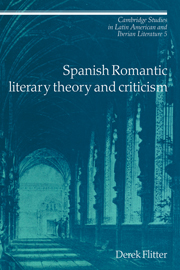Book contents
- Frontmatter
- Contents
- Preface
- List of abbreviations
- Introduction
- 1 Böhl von Faber and the establishment of a traditionalist Romanticism
- 2 The consolidation of Romantic ideas: 1820–1833
- 3 The exiles, liberal Romanticism and developments in criticism
- 4 Condemnation and clarification in the literary debate
- 5 Reaffirmation of Schlegelian principles in literary criticism
- 6 The religious spirit in literary ideas and the influence of Chateaubriand
- 7 The perception of literature's rôle in society
- 8 Romantic traditionalism in the work of Fernán Caballero
- 9 Conclusions: The mid-century
- Notes
- Bibliography
- Index
4 - Condemnation and clarification in the literary debate
Published online by Cambridge University Press: 02 November 2009
- Frontmatter
- Contents
- Preface
- List of abbreviations
- Introduction
- 1 Böhl von Faber and the establishment of a traditionalist Romanticism
- 2 The consolidation of Romantic ideas: 1820–1833
- 3 The exiles, liberal Romanticism and developments in criticism
- 4 Condemnation and clarification in the literary debate
- 5 Reaffirmation of Schlegelian principles in literary criticism
- 6 The religious spirit in literary ideas and the influence of Chateaubriand
- 7 The perception of literature's rôle in society
- 8 Romantic traditionalism in the work of Fernán Caballero
- 9 Conclusions: The mid-century
- Notes
- Bibliography
- Index
Summary
Edgar Allison Perrs regarded 1837 as the year of the failure of the Romantic movement in Spain, pointing to the triumph of a literary school which he denominated Eclecticism. According to this theory the Eclectic ideal involved a self-consciously reconciling criticism or juste milieu, in evidence since approximately 1820, which was able to triumph because of the ineffectiveness of the Romantic movement. Peers felt that the success of Eclecticism stemmed partly from the desire of Romantics to preserve features of the ‘Romantic Revival’ and partly from the vehement Classicist objections to the revolutionary elements of the ‘Romantic Revolt’. In his view Eclecticism, although not specially created as a compromise, satisfied most writers by rendering any extreme position impossible, so that by 1840 it had become the accepted literary mode of the day. A crucial element in Peers's theory was the disavowal of literary partisanship by a number of critics. He first quotes from an article, published in the recently established Semanario Pintoresco Español in 1836, in which Jose de la Revilla refused to countenance exclusive allegiance to either of the opposing schools: instead, a staunch supporter of beauty, he would enjoy with equal pleasure its charming effects in the works of Sophocles and in those of Victor Hugo, in the works of Shakespeare just as in those of Molière. Revilla's comment was only one of many, and Peers goes on to cite several more.
- Type
- Chapter
- Information
- Spanish Romantic Literary Theory and Criticism , pp. 76 - 91Publisher: Cambridge University PressPrint publication year: 1991



